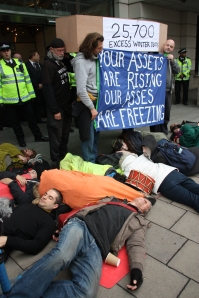Photos here: http://www.flickr.com/photos/70150038@N04/
Today, fifty protesters staged a ‘die-in’ protest at the head office of EDF, one of the ‘Big Six’ energy companies – protesters claim that the government and Big Six energy companies share responsibility for thousands of deaths caused by fuel poverty.

The protest was a response to new figures released by the Office for National Statistics this morning, which reveal that there were 25,700 excess winter deaths last winter in comparison to other seasons. Many of these deaths were due to the fact that people could not afford to heat their homes. Protesters claimed that the government was letting energy companies profit whilst leaving people to die in the cold.
The protesters carried a coffin, marked with the number of excess winter deaths, in a funeral procession from Parliament Square to the head office of EDF and ‘died’ on the ground outside wrapped in blankets and clutching hot water bottles under a banner reading, “Warmth to meet our needs, not for corporate greed”.
Samia Mitchell, a member of Fuel Poverty Action, said:
“Government and business are putting profits first and peoples’ lives second in deciding who gets to keep warm this winter. By continuing to support unsustainable fossil fuels over sustainable renewables, cutting the Winter Fuel Payment and shutting day centres, libraries, axing jobs and public services, millions are literally being left out in the cold. People shouldn’t have to decide between eating and heating. The ability to keep warm should not be dictated by how much money you have in your pocket. We want to see public control over how and from where our fuel comes from”.
– Fuel poverty is defined as expenditure of 10% or more of household income on fuel.
– According to the government-commissioned Hills Poverty Review, 2,700 people – a conservative estimate – will die this winter as a direct result of being ‘fuel poor’.[2]
– An April 2011 YouGov survey found that nearly 1 in 4 households (24% or 6.3million homes) were suffering fuel poverty. [3]
Jules Carpenter, a supporter of the protest, and mother of two, added:
“If the government supported a transition to renewable energy, people wouldn’t face this problem. Green measures are not the cause of high bills and fuel poverty – turning energy into a commodity and corporate competition to find cheaper, yet finite fossil fuels are. Green changes wouldn’t cost more if the government put climate agreements and health before bailing out the banks”
– Each of the six major energy suppliers in the UK raised their prices over the Summer of 2011.
– The government’s ‘Green Deal’ will insulate homes if customers are willing to sign up to what could be a thirty-year debt repayment. Critics point out, whilst insulation is necessary, it should not depend on ability to pay or stay in one property for decades. This is an unrealistic prospect for many single and low-income tenants.
The Fuel Poverty Action group, and other groups, are also planning a nationwide ‘warm in ‘ on the 27th and 28th of January which will see people occupying warm spaces, such as corporate buildings, in order to keep warm and highlight the injustice of energy pricing.
Notes to editors:
The Fuel Poverty Action group is a project of the Climate Justice Collective (CJC). The CJC has emerged out of Climate Camp UK. Fuel Poverty Action aims to expose the economic and environmental causes of fuel poverty and take action to realise energy democracy and climate justice. We are the 99%.
[1] Please contact 07542 358 310 for details of the location on the day.
[2] For the full Poverty Review see: http://www.decc.gov.uk/en/content/cms/funding/Fuel_poverty/Hills_Review/Hills_Review.aspx
[3] http://bit.ly/s4NbSh

